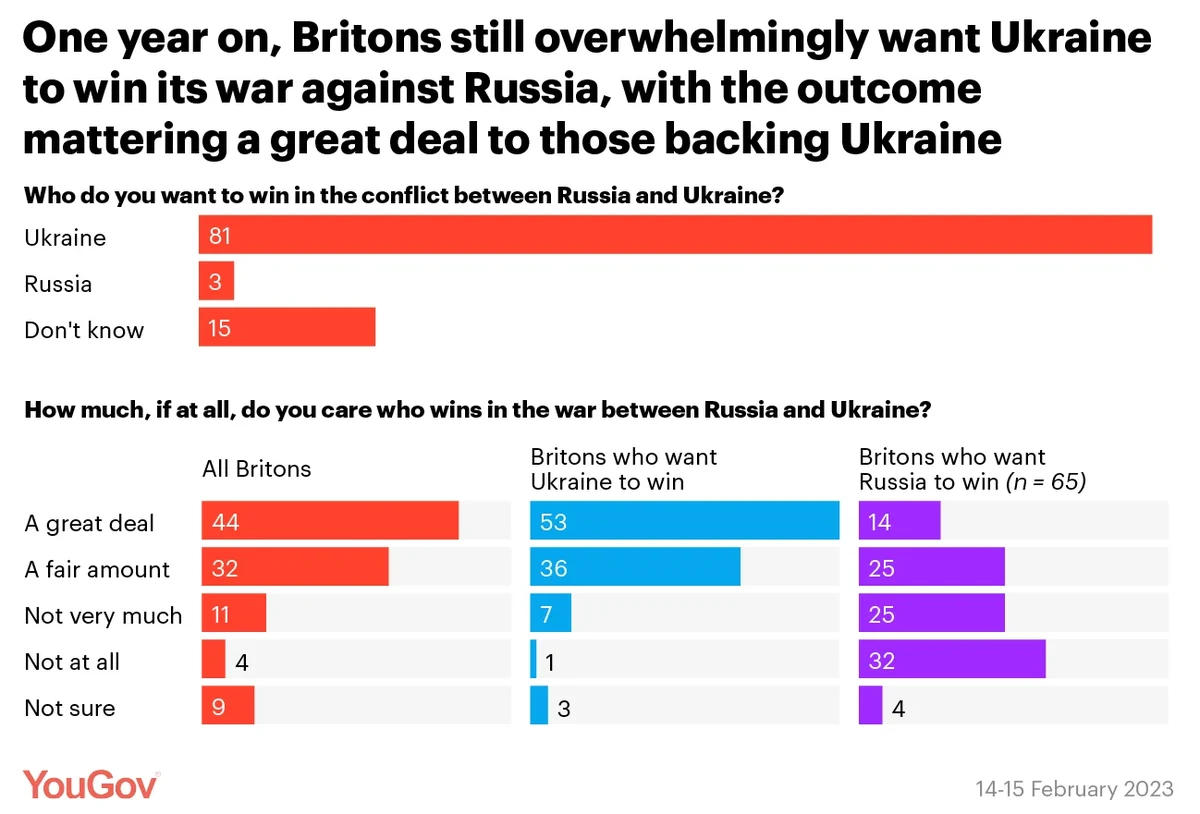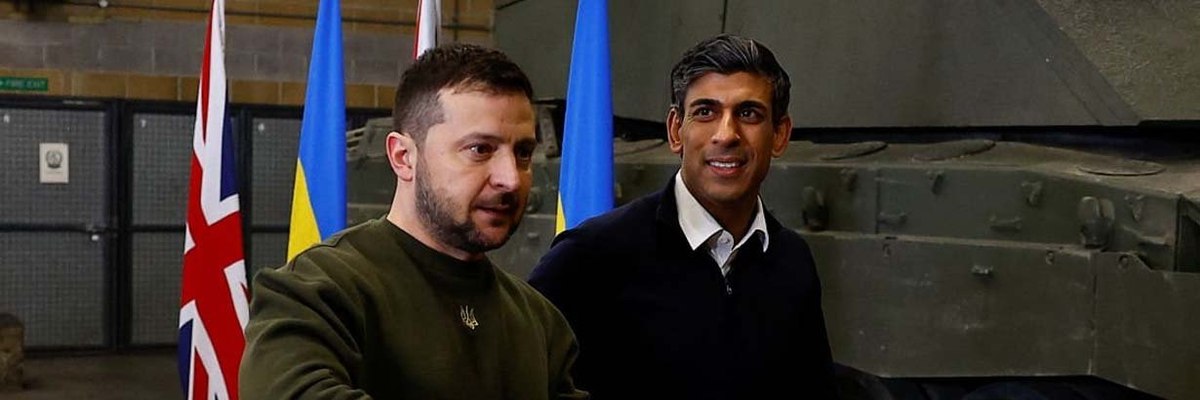Support for Ukraine remains strong, but has dipped marginally since the summer
With the first anniversary of the Russian invasion of Ukraine occurring on 24 February, a new YouGov study looks at the level of public support for helping the beleaguered nation one year into the conflict.
Britons still overwhelmingly want Ukraine to win the war
Eight in ten Britons say they want Ukraine to win (81%), compared to just 3% for Russia. These figures are virtually unchanged from the last time we asked in September.
Overall, three quarters of Britons say it matters to them who wins the war, including 44% who say it matters “a great deal”. Among those Britons who want Ukraine to win, this figure is 53%.

This does, however, represent a slight decline in the strength of feeling towards the outcome of the war compared to six months ago. The proportion of Britons who say they care a great deal about the outcome has fallen seven points from 51%, with the shift seemingly moving to “a fair amount”, which is up five points since September.
Among those who want Ukraine to win, the proportion saying it matters a great deal is down seven points from 60%, with an accompanying seven point increase in the number saying it matters a fair amount to them. As a proportion of the whole population, this means the number of Britons who want Ukraine to win and care a great deal that they do so is down from 50% in September to 43% now.
Britons want to support Ukraine until it wins, rather than negotiate a peace with Russia
At the Munich Security Conference this weekend Rishi Sunak made clear that the West’s approach should be to enable Ukraine to win the war, with French president Emmanuel Macron also saying he wants Russia to be defeated in Ukraine.
Britons also endorse this approach. Asked what came closest to their preference for the approach the West takes to the war, 53% of Britons answered: “to support Ukraine in its efforts against Russia until such a time that Russia withdraws from the country, even if this means the war and its effects last longer”.
Only 23% say “to encourage a negotiated peace to end the fighting, even if this means Russia still has control over some parts of Ukraine”, while 8% said neither option came close to their preference. The remaining 16% are unsure.
Britons don’t think the West is doing enough to stop Russia from winning in Ukraine…
Half of Britons (52%) say Western countries aren’t doing enough to prevent the Russians from winning the war in Ukraine, including 22% who think we’re not doing “nearly enough”. Only 17% think the West is providing enough support, while 3% think too much support is being give – 27% are unsure.
…but only a quarter say the UK should provide more support to Ukraine in general…
Despite a widely held desire for Ukraine to win the war, many Britons are reluctant to dedicate more support to the nation when asked in general.
The most common opinion, at 43%, is that Britain should maintain the same level of support it is giving to the beleaguered country. A little over a quarter (28%) want to increase the level of support, while 11% want to reduce support.
…although there is still strong support for individual means of helping Ukraine
However, when asked about specific levels of ways in which Britain could support Ukraine, including some which imply an increase in resource for the country, Britons are still largely in favour.
Support for maintaining the current sanctions against Russia stands at 75%, while a similar proportion are in favour of further economic sanctions on Russian interests in the UK (73%).
Willingness for the UK to provide additional weaponry and supplies to Ukraine stands at 65%, and most continue to back sending additional troops to support NATO members in Eastern Europe (52%).
A majority (57%) also back targeted media in Russian-speaking parts of Ukraine encouraging people there not to support the Russian leadership or armed forces, while by 47% to 19% Britons are in favour of providing support to domestic political opponents of the Russian leadership.
There is also more support (45%) than opposition (25%) for cyber attacks against Russian military capabilities.
Most Britons continue to oppose, however, sending troops into Ukraine (57%), and tend to oppose coordinating air strikes against Russian targets in Ukraine by 40% to 31%.
In almost all cases, support for each measure is down since early July, by between seven and eleven points (the exception is the three point difference for further economic sanctions, which is within the margin of error).
Neither side is seen as having the advantage in the Ukraine war
At the time of this latest poll, conducted on 14-15 February, 45% of Britons see the conflict as a stalemate, saying that neither side has the advantage. This is the largest figure for this view since we started asking at the beginning of the conflict.
One in five see Russia as having the upper hand (21%), up slightly from 16% in our previous poll in November, likely as a result of recent gains in the latest offensive. Meanwhile, 12% think Ukraine holds the advantage, down from a high of 31% at the time of the nation’s successful campaign of counter attacks in the autumn.
Most Britons think the Ukraine war will drag on for at least another year
With 12 months of conflict and suffering almost passed, the majority of Britons (56%) expect that in another year’s time Russia and Ukraine will still be at war. One in six (17%) believe that Russia will have withdrawn and Ukraine will be an independent nation, while 5% think Ukraine will be under Russian control.
Photo: Getty








